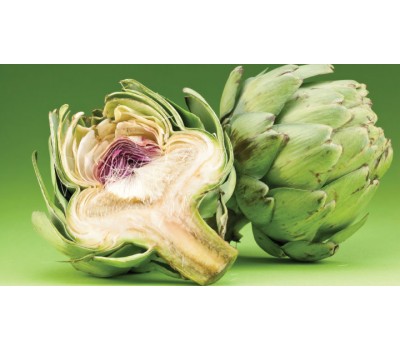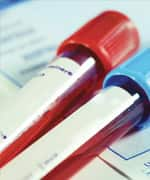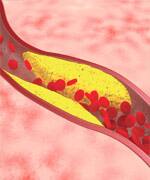Natural Methods To Control Cholesterol

Approximately 25 million people take statin drugs to reduce their cholesterol, yet heart disease remains the number one killer of Americans.1-3
While statins lower LDL cholesterol and C-reactive protein, and modestly elevate protective HDL cholesterol,4,5 they may increase the risk of heart failure in certain people.6,7
Researchers have now discovered two compounds that work together to safely lower dangerous LDL cholesterol—while simultaneously boosting protective HDL.
An extract from the leaves of artichoke has been shown to raise protective HDL levels without the side effects of statins.8
In addition, a derivative of vitamin B5, called pantethine, safely lowers LDL while maintaining CoQ10 at protective levels—resulting in an 11% reduction in major coronary heart disease events.9
Together, these two nutrients offer protection against two causes of vascular disease.
Statins Do Only Half The Job
Statin drugs potently lower cholesterol when used properly, but produce a number of side effects that too often cause people to discontinue using them.
Statins have been associated with muscle weakness and pain (myalgia), muscle breakdown (rhabdomyolysis), kidney disease, and negative effects on the digestive and central nervous systems.10,11 Even more disturbing, statins also raise the risk of developing diabetes by 9 to 13%12-15 (a risk that is up to 48% higher in postmenopausal women).16
Clearly, statins are not the panacea that pharmaceutical companies have led physicians and the public to believe. One drawback is that they don’t elevate HDL enough to confer meaningful removal of excess cholesterol buildup on the arterial wall via reverse cholesterol transport.
How Cholesterol Balance Dictates Your Health Risks
Lowering LDL is one piece of the puzzle for preventing heart disease. Another component is to raise HDL levels, which removes cholesterol from blood vessel walls and protects it from oxidation.17,18 Numerous epidemiological, animal, and human studies demonstrate the value of achieving and maintaining high HDL levels.19-30
In one impressive human study, each 5 mg/dL increase in HDL led to a reduction of up to 29% in the risk of cardiovascular disease; other studies show that the risk of having a heart attack or dying goes down 3% for each 1% increase in HDL.29,30
Statin drugs have a major problem: They reduce the production of coenzyme Q10, which is necessary for releasing energy from foods that heart cells need to function. This negative effect may paradoxically raiseheart failure risk in certain populations.6,7
What aging humans need is a balanced approach to reducing cardiovascular disease—one that safely lowers LDL while simultaneously raising HDL levels. Researchers have found two nutrients that can do just that.
Pantethine , a derivative of vitamin B5, safely lowers LDL without negatively impacting CoQ10 levels, whileartichoke leaf extract can raise HDL levels without harmful side effects.
Let’s look at artichoke leaf extract first.
RANGES OF LDL LEVELS AND IMPACT ON RISK9,60
 |
|
LDL Level (mg/dL) |
Associated Risk Category |
|
Less than 100* |
Optimal (minimal risk) |
|
100-129 |
Near optimal (low risk) |
|
130-159 |
Borderline high |
|
160-189 |
High |
|
190 and above |
Very high |
* While less than 100 mg/dL is the published upper limit of optimal, Life Extension®feels that the ideal limit should be less than 80 mg/dL. Those with pre-existing/high-risk cardiovascular disease should strive for less than 70 mg/dL,61,62 but should have hormone levels checked to make sure they are not being suppressed (many vital hormones are built on a “scaffold” of cholesterol molecules).63,64
Artichoke Leaf Extract
Artichokes are members of the thistle family. The edible portion of the plant is actually a giant flower bud, but the leaves that cover it are rich in flavonoid molecules that have been shown to help lower LDL cholesterol levels and raise protective HDL levels.
Chief among these is cynaropicrin,31 along with luteolin, cynaroside, and chlorogenic acid.32,33 These molecules protect the cholesterol in LDL particles from the dangerous oxidation that leads to atherosclerosis.32,34 Artichoke extracts are also able to inhibit the synthesis of new cholesterol molecules by nearly 60%, which might help to lower total blood cholesterol levels. 35
In addition, artichoke leaf extract promotes the fecal excretion of bile acids, which are detergent-like molecules that carry cholesterol out of the body. This action has been shown to lower total and non-HDL cholesterol levels in a preclinical study by 15 and 30%, respectively.36
These complementary mechanisms likely all contribute to the observed reduction in cardiovascular risk factors seen in human studies of supplementation with artichoke leaf extract.
Modest Reductions In Total Cholesterol And LDL
Human studies of supplementation with artichoke leaf extract show a reduction in cardiovascular risk factors, including reduced LDL and total cholesterol levels and improved endothelial function.
When researchers gave patients with high cholesterol (more than 280 mg/dL) 1,800 mg per day of dry artichoke leaf extract for six weeks, they saw tremendous results. Patients using the artichoke leaf extract experienced an 18.5% reduction in total cholesterol, while the placebo patients only saw an 8.6% reduction.37Importantly, LDL fell 23% in supplemented patients but by only 6% in controls, while the ratio of LDL to HDL decreased 20% in supplemented patients and only 7% in controls.
Another study demonstrated the ability of artichoke supplementation to improve the function of the endothelium, the thin layer of cells lining arteries. Since endothelial dysfunction is a first step in atherosclerosis, improving endothelial function is especially important in helping prevent heart disease.38 The study showed that patients with moderate hyperlipidemia who supplemented with artichoke experienced a36.4% improvement in endothelial function compared with controls and also had favorable decreases in blood markers of endothelial dysfunction, demonstrating the ability of artichoke to directly improve vascular health.
And in a study published in Phytomedicine, adults with mild to moderate cholesterol elevations who took 1,280 mg per day of a standardized artichoke leaf extract for 12 weeks reduced total cholesterol by an average of4.2% from baseline, while in control subjects that figure increased by an average of 1.9% during the study.39
WHAT YOU NEED TO KNOW
 |
Safely Control Cholesterol
- Americans continue to die at unacceptable rates from cardiovascular disease, partially driven by persistent elevations in LDL (“bad”) cholesterol and insufficient protection by HDL (“good”) cholesterol.
- Statins lower LDL cholesterol and some raise HDL cholesterol, but they produce side effects that may cause many people to stop taking the drugs, leaving them unprotected.
- Two natural ingredients are now available that can lower LDL cholesterol without reducing CoQ10 levels and increase beneficial HDL cholesterol.
- Pantethine, a derivative of vitamin B5, reliably lowers LDL cholesterol and the LDL carrier protein apoB, without statin-like side effects, and without lowering protective CoQ10 levels.
- Artichoke leaf extract raises protective HDL levels and levels of the HDL carrier protein, apoA.
- Dual-acting protection against America’s leading killer, cardiovascular disease, is now within reach of all Americans, without a prescription and through a natural product.
Artichoke Leaf Extract Increases HDL Cholesterol
The unique benefit from artichoke leaf extract comes from its ability to raise protective HDL cholesterol levels without adverse side effects.
Compelling evidence that artichoke leaf extract can raise protective HDL cholesterol levels has now arrived in a human study demonstrating a never-before-seen improvement in this vital risk-reducing factor.
The study examined 92 overweight subjects with an average body mass index of 25.4 who had mild elevations of total cholesterol. The subjects received either 250 mg twice daily (total 500 mg per day) of a triple standardized artichoke leaf extract or a placebo.8 After eight weeks, mean HDL cholesterol rose by 8 mg/dL in supplemented patients, but only by 0.2 mg/dL in controls. In those who received artichoke leaf extract, this represents a 10% increase in mean HDL cholesterol from baseline measurements.
In addition to a beneficial rise in good cholesterol, mean total cholesterol levels fell in supplemented patients by 15 mg/dL, but by only 5 mg/dL in controls. Significant differences were also shown in the total cholesterol/HDL ratio and in the LDL/HDL ratio in supplemented patients, compared with controls.8
Importantly, there were no adverse effects noted in this study.8
In a follow-up study, the same researchers found that when patients with mild cholesterol elevations took a daily 200 mg dose of artichoke leaf extract, their total cholesterol fell by nearly 10% after only 30 days.40Excitingly, this study also demonstrated a 19% increase in levels of protective apoA (the HDL cholesterol-carrying protein) and a similar 19% rise in the ratio of apoA to apoB (the LDL-associated protein).
UNDERSTANDING GOOD VERSUS BAD CHOLESTEROL
Cholesterol itself is neither good nor bad. It is simply an essential form of fat that contributes to our cell membranes and is an absolute requirement for the formation of many vital hormones and other signaling molecules.
The differences between “good” cholesterol and “bad” cholesterol are mainly related to protein molecules that carry the cholesterol and their ability to shield the fat molecule from oxidation as oxidized fats are powerful triggers of atherosclerosis.
These carriers, when loaded up with cholesterol, are called lipoproteins. Before being loaded with cholesterol, the carrier proteins are called apolipoproteins, with suffixes such as “A” and “B.”
Apolipoprotein A (or apoA), when loaded with cholesterol, is called high density lipoprotein, or HDL. HDL particles also contain auxiliary enzymes, including one called paraoxonase1 (or PON1), which have potent and specific effects. Because apoA helps draw cholesterol out of fat-laden cells,54,55 and because the presence of PON1 protects cholesterol from oxidation, HDL cholesterol particles have favorable health effects, earning them the title of “good cholesterol.”56
Apolipoprotein B (apoB), when loaded with cholesterol, is known as low density lipoprotein, or LDL. LDL particles are vulnerable to chemical changes induced by oxygen free radicals, however they are protected from oxidation via the activity of PON1.57,58 Because apoB transports oxidized cholesterol from the bloodstream and into cells, LDL cholesterol has the opposite effect from that of HDL cholesterol, exerting negative health effects and earning LDL the title of “bad cholesterol.”59
The “Magic Bullet” Behind Increased HDL Cholesterol
It’s clear that artichoke leaf extract can favorably impact HDL cholesterol levels, but how? Scientists are still uncovering those answers, but so far we know that artichoke extract has a number of potential mechanisms that could have a positive impact on HDL cholesterol.
Studies in humans demonstrate that supplementation with artichoke leaf extract raises levels of the protectiveapoA carrier molecule that supports the HDL particle,41 which contributes to observed increases in beneficial HDL levels.40 A pilot study has shown a significant 19% increase in apoA after 30 days of supplementation in a human population; in addition, the ratio of apoA to apoB rose by 19%.40
Another leading hypothesis behind artichoke leaf extract’s ability to raise HDL levels has to do with its high content of chlorogenic acid, known to raise HDL-cholesterol by enhancing PON1, the powerful enzyme that forms part of the HDL particle.8,42 Increased PON1 correlates strongly with HDL cholesterol.43
Pantethine Safely Lowers LDL Cholesterol

A long-standing concern with statins is that they reduce the production of essentialcoenzyme Q10, which may ultimately raise some cardiovascular risks in certain populations.6,7
Pantethine, a derivative of vitamin B5, reliably lowers LDL cholesterol without reducing CoQ10 levels.
Studies indicate that pantethine helps reduce cholesterol levels by dual mechanisms—reducing the rate of new cholesterol production and speeding the breakdown of existing cholesterol.9 Both lab and clinical studies show that these mechanisms lead to real-world reductions in dangerous cholesterol levels.
Laboratory studies have shown that adding pantethine to liver cells in culture significantly reduces the production of fatty acids while increasing fat-burning activity.44 As far back as 1984, a study on live rabbits fed a high-cholesterol diet found that pantethine supplementation reduced plasma total cholesterol levels by64.7% compared with control animals.45 Supplemented animals also demonstrated an increase in the beneficial HDL/total cholesterol ratio, a more than 18% reduction in the area of aortic plaque formation, and a reduction in the severity of lesions in the aorta and in the coronary arteries.
After that study was published, a variety of small studies during the late 1980s and early 1990s began exploring pantethine for human use—and all demonstrated pantethine’s ability to reduce total and LDL cholesterol, as well as its ability to reduce the ratio of total cholesterol to HDL. 46-50
But it is the dramatic findings of two recent studies that have experts re-energized about pantethine in reducing risk factors for cardiovascular disease.
The first study involved people in basically good health, but whose lipid profiles placed them in a low-to-moderate risk of cardiovascular disease. 51 Because of their low risk, these patients were not candidates for statin therapy, making them ideal for a prevention study of this kind.
For four weeks, all subjects were started on a therapeutic lifestyle-change diet, with the main focus being a reduction in saturated fat. After that, they were randomly assigned to receive 600 mg per day of pantethine or a placebo for the next eight weeks, and then 900 mg per day for an additional eight weeks. At the end of the study, placebo recipients had no significant changes in total or LDL cholesterol or levels of apoB (the LDL-associated protein). Pantethine-supplemented subjects, however, had modest reductions in total cholesterol of6 mg/dL (3% from baseline), in LDL of 4 mg/dL (4% from baseline), and in apoB of 4 mg/dL (5% from baseline).51
A study of similar design in 2014 found better results.9 After just four weeks, the researchers noted significant differences between the supplemented and placebo groups. And after 16 weeks, the patients supplementing with pantethine experienced reductions from baseline in total cholesterol of 6%, in LDL of 11%, and non-HDL cholesterol of 8%. Interestingly, an increase in the dose of pantethine from 600 to 900 mg per day during weeks 8 through 16 did not produce additional changes in LDL. An additional critical finding in this study was an 8% reduction in apoB from baseline in the supplemented group—a significant reduction since apoB is the core protein in the deadly LDL cholesterol particle.
Given that for each 1% reduction in LDL cholesterol levels there is a correlating 1% reduction in the risk of coronary artery events, these pantethine-induced changes bode extremely well for those at risk for cardiovascular diseases. In this study, the 11% reduction in LDL cholesterol translates into a highly meaningful11% decrease in the risk of a heart attack or other coronary artery disorder.9
An additional important factor in the context of safety here is that levels of CoQ10 did not fall (indeed, they rose slightly) with supplementation. This is in direct contradistinction to statins, which produce dangerous lowering of CoQ10, potentially impairing energy metabolism in heart and skeletal muscles.
NEW AND IMPROVED VITAMIN B5
 |
Pantethine is a derivative of vitamin B5 (pantothenic acid).9,65 It lowers cholesterol—particularly the risk-producing LDL form—by enhancing cellular utilization of fats and sugars and by reducing the production of new cholesterol molecules.9 Pantethine essentially functions as a more metabolically active form of vitamin B5. Its benefits are especially seen in how it relates to an essential enzyme cofactor called Coenzyme A (CoA).
Vitamin B5 is the precursor molecule to CoA. Unlike vitamin B5, however, pantethine participates directly in reactions requiring CoA, without the need to undergo additional enzymatic conversion that is required of B5 itself.66
Once pantethine has been efficiently converted into CoA, CoA participates in more than 70 crucial enzymatic reactions in the body—particularly those involving the breakdown of food molecules and release of the energy in their chemical bonds to do useful work in the cell.66 This is important because every single fat and sugar molecule you eat must eventually combine with a CoA molecule to enter the cycle of reactions that will release its chemical energy.
Research shows that supplementation with pantethine significantly raises the content and activity of CoA in the liver, much more efficiently than does vitamin B5 itself.67
Summary
Virtually every American is at significant risk for cardiovascular diseases as they age. Factors behind this risk include elevations in LDL and insufficient protective HDL.
Mainstream medicine and Big Pharma have succeeded in getting more than 25 million Americans to use statin drugs that lower LDL cholesterol at the expense of side effects so pronounced that over 20% stop using statins,52 leaving them vulnerable to LDL-induced arterial disease.
A new combination of ingredients includes pantethine, shown to safely lower LDL without statin-like side effects, and a novel artichoke leaf extract, capable of raising HDL levels. This combination is likely to provide dual-acting benefits.
Those with moderately elevated LDL and/or insufficient HDL may be able to eliminate statin drugs through use of the natural compounds described in this article.
For people with stubbornly high LDL that may require statin drug therapy, the advantage of adding these natural compounds is that it may enable the dose of the statin drug to be reduced to a level where side effects are minimized or eliminated.
A fact that physicians have yet to grasp is that lower-dose statins in most patients can provide equivalent protective benefits as high doses promoted by profit-hungry pharmaceutical companies. This was shown in a study with the popular statin drug atorvastatin (Lipitor®), whereby fewer patients taking lower doses died from any cause compared to higher doses.53
Statin drugs are demonized by advocates of natural approaches, and the horrific side effects inflicted by high-dose statins justify these concerns, especially for those who do not adequately supplement with CoQ10.
An objective strategy when taking into account the high rates of disability and death caused by arterial disease is to try lifestyle and natural approaches to reduce LDL below 100 mg/dL and increase HDL as high above 50 mg/dL as possible. If these safe methods fail, then use the absolute lowest dose of a statin drug to achieve LDL/HDL blood readings in the safe ranges.
By Susan Wiggins
Article extracted from Life Extension Magazine May 2015


Social Login